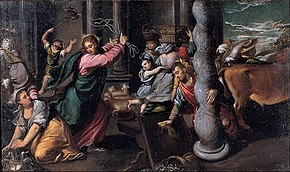I recently read a comment from a pastor who was angry about the behaviour of a politician. Nothing strange about that you may think, and I agree. What was a little out of the ordinary, though, was that the pastor suggested he’d like to do something painful to the politician and, to justify his viewpoint, he quoted the story of Jesus cleansing the Temple.
“WWJD: he would have made a whip and beat the crap out of him!”
I’ve heard a few people over the years use this story about Jesus and the whip as a license for some act of violence against another person (or people). But is that really what Jesus is doing here, and does this story encourage the use of violence?
Jesus in the Temple
Even though the account of the cleansing of the Temple is found in all four Gospels, it’s only the apostle John who mentions a whip (John 2:15). There is no mention of Jesus using the whip against a person; in fact, John reports that he used the whip to drive both the sheep and the cattle out of the Temple. John doesn’t say Jesus hit the animals either.
Jesus’ Purpose
The most important question here is, why did Jesus act in this way? What did he want to teach his followers? It certainly wasn’t to “beat the crap” out of someone with whom we disagree.
All the way through his ministry years, Jesus faced resistance from the Jewish religious leaders. Jesus came with the revelation that God, the father, was compassionate (Luke 6:36). In contrast, the predominant theme of the first century Judaism was purity, not compassion: “You must be holy because I, the LORD your God, am holy.” The Gospels record the constant clash of cultures between Jesus’ compassion for people and the purity code of the day. That’s what the cleansing of the Temple was all about.
Old Testament Temple law didn’t restrict the access of women or non-Jews. But over the centuries, purity laws were extended. By the time of Jesus, women and Gentiles were excluded from the Court of Israel on pain of death.
It was Passover, and space that was meant for people in the Court of Gentiles was taken up by merchants, their tables, and their animals. And that’s why Jesus’ anger boiled over. He had come for those on the margins of society, those who were often excluded by the purity laws – the unclean, the poor, sinners, tax collectors, women, lepers, the disabled, and so on. He came to bring IN those who were kept OUT by man-made religion.
Jesus’ Anger at Injustice
As Jesus is clearing the Temple, he quotes from the Scriptures, “It is written, ‘My house shall be called a house of prayer,’ but you make it a den of robbers” (Isaiah 56:7; Jeremiah 7:11). Isaiah goes on to speak of the Temple being for the Gentiles as well (a house of prayer for all nations), a fact that many of Matthew’s readers would have been well aware. And so, Jesus’ action here becomes clear. He’s providing room for those who have been left out. Matthew tells us, “and the blind and the lame came to him in the temple, and he healed them.” Hang on a minute! The blind and the lame weren’t allowed in the Temple. Ah, that’s the point. Jesus consistently brought in those who were left out – and so should his church today!
Grace & Compassion
This story has nothing to do with excusing violence against someone with whom we disagree and everything to do with extending grace and compassion to people in distress. If Jesus were here today, he wouldn’t make a whip and beat the crap out of anyone.
Another occasion makes Jesus’ peaceful intentions clear. He and his disciples had been rejected by a Samaritan town. James and John (the ones most likely to make whips to beat people) suggested they could “call fire down from heaven to destroy them.” Jesus rebuked them because “the Son of man didn’t come to destroy men’s lives, but to save them.” But Jesus, don’t you want to beat the crap out of them? “No, I’m the Prince of Peace, not a man of violence!”



 Jesus came near
Jesus came near Jesus taught everyone is included
Jesus taught everyone is included
 even their own life—such a person cannot be my disciple. And whoever does not carry their cross and follow me cannot be my disciple … those of you who do not give up everything you have cannot be my disciples” (Luke 14:25-33).
even their own life—such a person cannot be my disciple. And whoever does not carry their cross and follow me cannot be my disciple … those of you who do not give up everything you have cannot be my disciples” (Luke 14:25-33).
 Sadly, the “mentality of more” didn’t pass away with the Pharisees. It’s still alive and well even amongst followers of Jesus today who have bought into a consumer mindset of their faith.
Sadly, the “mentality of more” didn’t pass away with the Pharisees. It’s still alive and well even amongst followers of Jesus today who have bought into a consumer mindset of their faith.

 The overly severe Pharisees accused Jesus and his disciples of being gluttons and drunkards. Of course, they were neither, but in the eyes of the stern religious people of the day, they were guilty because they associated with people who were. The first miracle Jesus did was turning water into the best wine at a seven-day wedding feast. Unfortunately, some of the Christian faith over the centuries has been about transforming the wine back into water!
The overly severe Pharisees accused Jesus and his disciples of being gluttons and drunkards. Of course, they were neither, but in the eyes of the stern religious people of the day, they were guilty because they associated with people who were. The first miracle Jesus did was turning water into the best wine at a seven-day wedding feast. Unfortunately, some of the Christian faith over the centuries has been about transforming the wine back into water!







